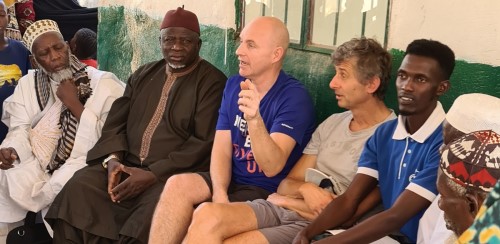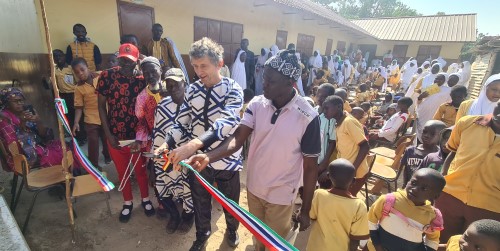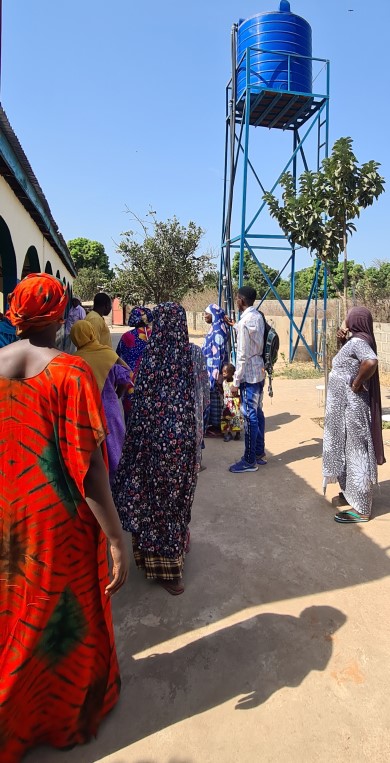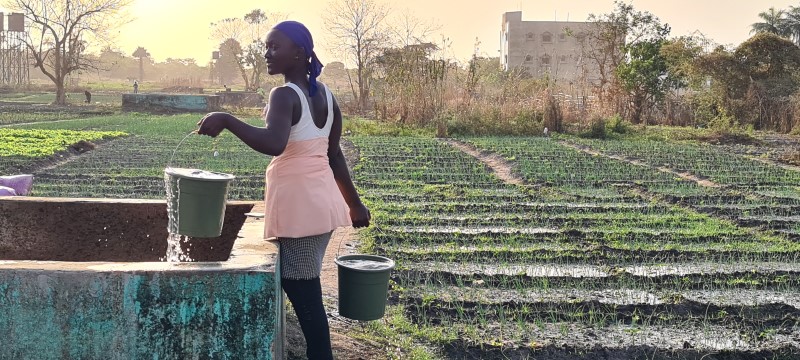Dirk Depoorter
Friday 13 Januari
Get up (too) early… 3.40 am, because Dirk picks me up at 4.00 am. Flight to Gambia at 5.50am to arrive in Banjul at 11.50am local time. That's an hour earlier than here. Little movement at the airport, smooth check-in and customs control. Still time to discuss our program, because we are not sitting next to each other. Smooth flight, still able to sleep well, unlike Dirk.
Banjul, International Airport The Gambia, 11.50am. After the usual administration and checkpoints to the exit. Our employees Omar and Lamin are waiting for us. Heartfelt review. Since we are only really on site for four days, we asked Omar to start the visits and appointments immediately.
Abuko nursery school
Appointment in our Gammol school in Abuko with the head teacher Omar and one of his highly motivated teachers, Pierre. We discuss our objectives with regard to education with them. First we ask about their curricula and learning methods. In the nursery school (kindergarten education) they work with a 4-year plan, structured but outdated. The idea of a Gammol School Committee is enthusiastically received and Pierre wants to pull this off. The same goes for the idea of evening classes for adults. We suggest that its content should be determined by the community itself according to their needs. Start with a survey/brainstorming. In between, I ask Pierre what his salary is: 4,000 dalasi per month, about 60 euros, and only in the months that education is given. That makes about 600 euros a year…
Willingara
 Willingara is our next stop. One of the new water projects. We are received with all due respect by a large delegation from the village. It is rather a small town, since there are about 16,000 inhabitants in the entire community, and 60,000 in the wider area. They estimate, because there are no precise figures. It is easier to calculate in compounds. These are the residences of the families, where usually between 10 and 15 people live together. Our installations are not designed for such a large number, depending on the density of the population, our installation (pump with 1 km of pipe and ten taps) serves between 1,500 and 4,000 heads. The demand for additional pumps, up to 10 extra, was to be expected! We explain how we determine our priorities. In addition, they also ask for the repair of their mosque. We say a clear “no” to that. Not from any religious conviction, but because we focus on water, education and healthcare.
Willingara is our next stop. One of the new water projects. We are received with all due respect by a large delegation from the village. It is rather a small town, since there are about 16,000 inhabitants in the entire community, and 60,000 in the wider area. They estimate, because there are no precise figures. It is easier to calculate in compounds. These are the residences of the families, where usually between 10 and 15 people live together. Our installations are not designed for such a large number, depending on the density of the population, our installation (pump with 1 km of pipe and ten taps) serves between 1,500 and 4,000 heads. The demand for additional pumps, up to 10 extra, was to be expected! We explain how we determine our priorities. In addition, they also ask for the repair of their mosque. We say a clear “no” to that. Not from any religious conviction, but because we focus on water, education and healthcare.
Sinchu Sorrie
Sinchu Sorrie is the last stop for today. Also a new installation where we had bad luck. For some reason the shaft of the well we drilled has collapsed. The counselor in charge talks about sabotage, a political reckoning related to the elections. Not great news, but we decided to drill a new well anyway. Here too we get the demand for additional pumps. A common thread in all our visits. So I'm not going to repeat myself.
In the meantime it is already evening, time to go to our lodge, where we are warmly welcomed by the owner Oliver Monk. Small lodge with 2 rooms, so we are the only guests. We decide to eat here every morning and evening, together with Omar and Lamin, so as not to waste any time and to be able to chat afterwards. Appointment tomorrow Saturday at 8:00 am.
Saturday 14 Januari
Today we stay in the region of Sanyang. We have set up many projects here. It is also the home of Gammol.
Sanchaba school
After our breakfast we leave for the Abubacarr Sidiki Arabic School in Sanchaba. This is the school we built last year, in 2021, and where we built an additional extension in 2022: two extra classrooms, a kitchen with storage space, decent sanitary facilities and a playable playground. In addition, we have provided the classrooms with decent tables and chairs for the students.
 First surprise: despite it being Saturday, all students, teachers and many parents showed up to give us a warm welcome, to thank us and our sponsors for what we have achieved. It will be a festive morning, which we had not counted on and which was not foreseen given the limited time we are here. But there's no escaping it. We are put in party clothes and are treated to singing (about 200 students singing together), a play, a teaching moment, various speeches, and the obligatory group photo. We are also asked to say something, with our message being that the teachers can best thank us by providing quality education, and the children by learning well. Then it's up to Dirk to cut the ribbon of the new classroom building with two new classrooms.
First surprise: despite it being Saturday, all students, teachers and many parents showed up to give us a warm welcome, to thank us and our sponsors for what we have achieved. It will be a festive morning, which we had not counted on and which was not foreseen given the limited time we are here. But there's no escaping it. We are put in party clothes and are treated to singing (about 200 students singing together), a play, a teaching moment, various speeches, and the obligatory group photo. We are also asked to say something, with our message being that the teachers can best thank us by providing quality education, and the children by learning well. Then it's up to Dirk to cut the ribbon of the new classroom building with two new classrooms.
Second surprise is that we see that part of the playground is occupied by 2 extra classrooms in corrugated iron. Reason: too many children, resulting in a shortage of space. When we address the headmaster and the VDC (Village Development Committee) about this, we get an apologetic answer: “we can't refuse those children to attend an education”. Little to object. We do point out to them the need to provide quality education, and that classes that are too large may be counterproductive. A point of interest.
Once the festivities are over, we sit together to discuss their needs and our hopes and expectations for the children. Here too we refer to the same themes as in the Abuko school, and here too we feel the openness to at least think along. We make it clear to them that our hope is that the Abubacarr school can become an example for the other schools in Sanyang. Here too we ask about their curricula, but it is clear that they are less advanced in terms of education than in Abuko. One of the problems is finding qualified teachers.
Nimisat
 Later than expected we leave for the Nimisat Community Water Project. We were here in May last year, but in the meantime additional extensions have been installed at the pump. We are welcomed with a dance by the women, those who benefit most from the installation of our water installations, because “taking care of water and everything related to it is the task of the women”. They emphasize once again what the pump has brought them: in the past there were two ways to get water: using buckets, ropes and women's power to get impure water from wells that are 10 to 15 meters deep, or getting up at 4 o'clock, because then water comes out of the taps, supplied by NAWEC (the national water company). It goes without saying that this is at the expense of the health of both women and children.
Later than expected we leave for the Nimisat Community Water Project. We were here in May last year, but in the meantime additional extensions have been installed at the pump. We are welcomed with a dance by the women, those who benefit most from the installation of our water installations, because “taking care of water and everything related to it is the task of the women”. They emphasize once again what the pump has brought them: in the past there were two ways to get water: using buckets, ropes and women's power to get impure water from wells that are 10 to 15 meters deep, or getting up at 4 o'clock, because then water comes out of the taps, supplied by NAWEC (the national water company). It goes without saying that this is at the expense of the health of both women and children.
The water installation now has a pipe network of approx. 1,400 meters with 12 taps. Nimisat Village has a “marketplace” which is very important for the community and asks whether it is possible to provide water there as well. This is the village that has been asking for a contribution to the various compounds (families) since the start of the project, so that they can install extensions themselves, after advice from Gammol. This way they have been able to save 33 000 Dalasi so far. Just under 500 euros, which is a very large amount there. Before we leave we are thanked again for the contribution we have made with our project. We get a box full of fruit, and cans of lemonade. We would like to share this with the attendees, knowing that they have no surplus, but Omar makes it clear to us that we are not allowed to do this.
Fula Kunku
On to Fula Kunku. This is the first water project that our 2 employees in Gambia, Omar and Lamin, have completely installed themselves. Another installation of the old stamp (low tower, small water barrel). What to expect: ask for a more efficient installation. I notice that a tap is being tapped that runs to a construction site, whereupon I ask whether the client will pay for the water he uses to straighten his house? Evasive answer. We then propose that a “tap committee” be set up, just like in Nimisat, so that the community also invests in expanding the existing installation.
Falaah
We continue to Faalaa, where we have an old generation water installation. We mainly want to discuss a new school project. And we are expected! A guard of honor with all school children on both sides, I estimate about 150, who started singing for us and made a number of nice boards with a message for Gammol. We are met by Senebu, a very vital lady, who is in control here. As far as the water supply is concerned: here too there is a demand for larger installations that should allow a community garden to be supplied with water more easily. Now barrels of 50 liters are filled and prepared in the garden, so that everything can be sprayed by evening. Part of the proceeds from the vegetables that are grown and sold are used to provide lunch to the children of the school.
So there was already a school there. However, on July 7, 2021, in the middle of the rainy season, the roof was blown off, after which the rain had free rein and the walls of the classrooms collapsed. Fortunately, there were no children present at the time. About 200 children came to the nursery school. Since there are no more classrooms, they have built two classrooms in corrugated iron. The students now come in two shifts: morning and afternoon. The Faala nursery school was already on our agenda after our visit last year. After all, we had already established that the classrooms were not really solidly built. One of the classrooms had already collapsed.
 What needs to be done here in Faala is building new classrooms, sanitary facilities and a cooking area. And if possible a new, higher tower with a water tank of 5,000 liters. Senebu has set up a committee to make all this happen, looking at Gammol. This is a project that we wish to realize. We make clear how we see it and what our expectations are. What is obvious to us will have to grow there step by step. But the motivation is there. And the initiative too, see the classrooms built in corrugated iron! We agree that their roadmap will help determine the realization of this beautiful and large project. We close this visit with a few nice speeches, including one of the (shy) children.
What needs to be done here in Faala is building new classrooms, sanitary facilities and a cooking area. And if possible a new, higher tower with a water tank of 5,000 liters. Senebu has set up a committee to make all this happen, looking at Gammol. This is a project that we wish to realize. We make clear how we see it and what our expectations are. What is obvious to us will have to grow there step by step. But the motivation is there. And the initiative too, see the classrooms built in corrugated iron! We agree that their roadmap will help determine the realization of this beautiful and large project. We close this visit with a few nice speeches, including one of the (shy) children.
Senebu then invites us to eat in her compound. Cozy together from a large bowl, a feast according to their standards, but also in our experience. On the way to her compound we meet a tailor who proudly shows us his workshop, where he sews the women's beautiful clothes. One of the ideas to teach in evening classes? We also see that in some gardens water is still drawn from the "old" sources, and in the "old" way. Physical work… for the women! This water is no longer used for drinking or cooking, but to water local gardens.
Sanyang garden
Last stop for today is the Sanyang Garden in Salaba. A mandatory passage on each of our visits to The Gambia. A community garden of 500 m x 150 m that is supplied with water thanks to our installations. Water is pumped into large reservoirs spread over the garden, so that the many gardens can be watered. Problem with one of the inverters, causing the pump to stop between 11am and 3pm, just when the sun shines brightest. I have telephone contact with the company that does the installation and maintenance, after which Omar makes an appointment for repair.
In the evening we go over our earlier idea to start a lodge, and the administrative problems we encountered in order to arrange the necessary documents. Some self-interest on the part of the civil servant involved is not strange to the fact that we have put this in the fridge at the moment. We also discuss with Omar how we can continue with Leetulor, Mien and Marijke's health project, which is currently running on a slower pace. To be further discussed in Belgium with those involved.
